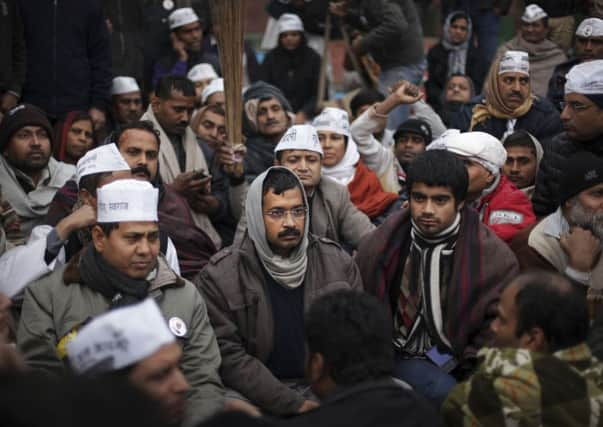India: ‘Anarchist’ leader takes protest to street


Yesterday morning, a shivering Mr Kejriwal emerged from under a blanket after sleeping outside in the cold January weather.
Coughing and struggling to speak, he declared that his protest against alleged inaction by the New Delhi police was indefinite and he would not move from the site of his protest, one of India’s most sensitive areas where top ministries are located.
Advertisement
Hide AdAdvertisement
Hide Ad“I am of the opinion and perhaps the public is also of the opinion that in any given area, at least 90 per cent of the crime happens in connivance with the police,” he told supporters on the second day of the sit-in.
The corruption-fighting for-mer activist was elected in Dec-ember promising to fix problems faced by the common man in the chaotic city of 16 million people.
His one-year-old Aam Aadmi Party, or Common Man Party, is now using its success in Delhi to build a national presence ahead of a general election due by May.
But he has been criticised for his style of governing, after a near stampede blighted a meeting where he called on Delhi residents to air their grievances and one of his ministers was filmed shouting at police.
His head wrapped in a woolly scarf, Mr Kejriwal called on supporters to join him at the protest site, a move that could disrupt a major military parade due on Sunday, the anniversary of India’s constitution.
When an unseasonal rain storm drenched a crowd of a couple of hundred supporters, Mr Kejriwal retreated to his trademark blue Maruti Wagon R, a low-cost car favoured by the city’s taxi drivers, and held a cramped meeting with aides.
In the first three weeks in office, he has transferred dozens of officials accused of corruption, slashed electricity and water prices and refused the smart housing and security that comes with his new job in an attack on hated VIP culture.
The anti-police sit-in has divided opinion in Delhi. Critics called it anarchic and unseemly for an elected leader of a major world city.
Advertisement
Hide AdAdvertisement
Hide Ad“Forming a party and running a government is very different from leading an agitation,” said Arun Jaitly, a leader with the main opposition Bharatiya Janata Party.
But the protest also tapped into deep anger with alleged police corruption and inaction in a city blighted by an epidemic of sex crimes.
“This kind of effort will increase the Aam Aadmi Party’s chances nationally by increasing its visibility,” said Arvind Gupta, a telecommunications engineer who took a day off work to go to join supporters at the protest site.
Minor scuffles between supporters who tried to scale a barricade and police officers broke out on more than one occasion.
The sit-in in the heart of Delhi further disrupted the Indian capital’s chaotic traffic.
Mr Kejriwal said on Monday he embraced the sobriquet of “anarchist” used by his critics, saying he wanted Delhi’s political elite to feel the kind of anarchy that lawlessness brings to the lives of normal citizens.
His row with the police started last week, when one of his ministers was filmed arguing with officers during a night raid in a neighbourhood popular with African immigrants. Police refused to search a house the minister claimed was being used as a brothel, saying they did not have a warrant.
The incident became a diplomatic headache. On Saturday, officials from the foreign ministry met envoys from more than 20 African states to assure them that it was not government policy to target African immigrants.